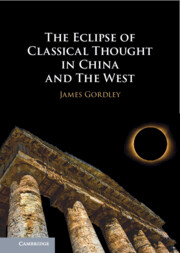Book contents
- The Eclipse of Classical Thought in China and the West
- The Eclipse of Classical Thought in China and the West
- Copyright page
- Dedication
- Contents
- Acknowledgments
- 1 The Dilemma
- Part I Two Ancient Traditions
- Part II The Formation of Two Constitutions
- 8 A Confucian Empire: Song Dynasty China
- 9 A Democratic Republic
- Part III The Eclipse of Classical Thought
- Appendix The Encounter with the Abrahamic Religions
- Index
9 - A Democratic Republic
The United States of America
from Part II - The Formation of Two Constitutions
Published online by Cambridge University Press: 26 July 2022
- The Eclipse of Classical Thought in China and the West
- The Eclipse of Classical Thought in China and the West
- Copyright page
- Dedication
- Contents
- Acknowledgments
- 1 The Dilemma
- Part I Two Ancient Traditions
- Part II The Formation of Two Constitutions
- 8 A Confucian Empire: Song Dynasty China
- 9 A Democratic Republic
- Part III The Eclipse of Classical Thought
- Appendix The Encounter with the Abrahamic Religions
- Index
Summary
In 1776, representatives meeting in Philadelphia as a congress “of the thirteen united States of America” unanimously adopted a Declaration of Independence, which stated that “these United Colonies are, and of Right ought to be Free and Independent States.”
The former colonies fought and won a war for their independence, recognized by the Treaty of Paris in 1783. In that year, a group of officers of the Continental Army planned to march on Congress to demand their back pay and guarantees for the future. George Washington met with them and persuaded them not to do so. Later that year, he resigned as Commander-in-Chief. He did not impose a military government as Oliver Cromwell had done. He did not try to make himself king, which George III said marked him “as the greatest man in the world.”
- Type
- Chapter
- Information
- The Eclipse of Classical Thought in China and The West , pp. 155 - 202Publisher: Cambridge University PressPrint publication year: 2022

